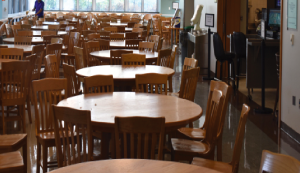Episcopal Academy Staff: In light of the new schedule, students have been given large periods of free time and have been excused from lunch duty with the hopes that they would be responsible enough to clean up their own messes. For this trust, we are thankful.
Too often teenagers are stuck in situations where they are expected to behave like adults, yet are still treated like children. This inconsistent treatment from parents, teachers, other adult figures, and even the law ultimately inhibits adolescents’ ability to smoothly develop into functional, responsible adults, and contributes to the angst and defiance that is commonly associated with teens.
Alan Greenblatt, a writer for Governing.com, notes in his article “What is the Age of Responsibility?” that “practically from puberty, young people are bombarded with mixed signals about the scope of their rights and the depth of their responsibilities.” Articulate in his explanation of this social phenomenon, Greenblatt goes on to raise the point that though teenagers can drive at the age of 16, marry at the age of 16 (with a parent’s consent), vote and enlist at the age of 18, they are oftentimes still not trusted with trivial tasks.

As the academic year began, teachers at Episcopal were nervous with the idea of leaving students for long stretches of time and trusting them to keep the cafeteria space clean without the enforcement of lunch duty. In the eyes of Greenblatt and students alike, the mistrust that lies behind these thoughts appears hypocritical; it is inherently confusing that students be excluded from these simple responsibilities, yet once the school day is finished, half of the student body is trusted to control a car going 50 mph down 252.
“I think it’s great that we don’t have to do lunch duty anymore, because it feels like the school and teachers actually trust us to clean the tables.”-Annie Doig ’18
It is understandable, however, that administrators were wary of trusting students with these new changes in the beginning of the year. Students have broken trust before, and it is likely that at some point they will break it again. Nonetheless, students still must be given the chance. The majority typically rises to the occasion. Sam Willis, VI Form Dean, says that for the most part, “It is going well. There’s no doubt that some workers in our lunchroom are still finding that our students are leaving trash, but I think if you ask anyone who is a part of the Upper School community, on a daily basis there’s less trash, there’s less of a mess being left on every table afterwards.” Additionally, he notes, “Giving a freshman or sophomore or any student anywhere from one to two to three hours free, there’s a lot of implicit trust in that. But from what I’ve seen so far, students are definitely stepping up to the occasion. They appear to be doing more work during their free periods, and appear to be better rested.”
So far, students seem content with the new schedule and the freedoms it offers. Annie Doig ‘18 says, “I think it’s great that we don’t have to do lunch duty anymore, because it feels like the school and teachers actually trust us to clean the tables.” While these changes may seem trivial, on a grander scale they allow students to mature into strong, functioning members of our community.
We hope that students will rise up to the occasion, and prove themselves worthy of this trust.